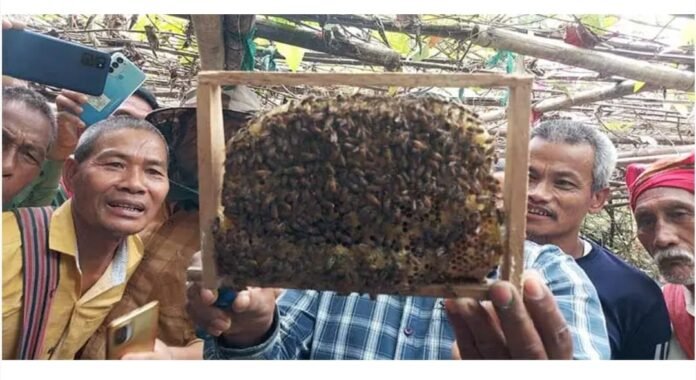Guwahati, Assam – Aaranyak, a renowned environmental organization, joined forces with the Council of Scientific and Industrial Research-North East Institute of Science and Technology (CSIR-NEIST) in Jorhat to conduct a two-day training program focused on beekeeping and honey bee hive distribution. The initiative aimed to benefit the villagers residing in the Kohora River basin (KRB) and Diring River basin (DRB) regions. The event took place at the community resource centre, where participants were equipped with essential knowledge and provided with bee hives to encourage sustainable beekeeping practices.
Beekeeping is a sustainable practice that offers multiple benefits, including generating income and contributing to environmental conservation. Recognizing the potential of beekeeping to empower rural communities, Aaranyak and CSIR-NEIST collaborated to organize a comprehensive training program for villagers in the KRB and DRB regions. The primary objective was to equip participants with the necessary skills and knowledge to engage in beekeeping as an alternative source of income.
The two-day training program featured a diverse curriculum that covered various aspects of beekeeping. Seasoned experts and experienced beekeeping practitioners from Aaranyak and CSIR-NEIST led the sessions, sharing their knowledge on bee biology, hive management, honey production, and the ecological importance of bees. The trainers emphasized the critical role of bees in pollination and their impact on agricultural productivity and biodiversity conservation.
Practical demonstrations were a key component of the training, allowing participants to gain hands-on experience in hive construction, pest management, and honey extraction techniques. The trainers showcased different types of hives, emphasizing their suitability to the local environment. Participants actively engaged in hive assembly, learning the intricacies of hive construction and maintenance.
One of the program’s highlights was the distribution of honey bee hives to the villagers of KRB and DRB. This step aimed to kickstart their beekeeping endeavors by providing them with the necessary equipment to set up their own hives and initiate honey production. The trainers guided the participants on proper hive placement, ensuring optimal conditions for honey bee colonies to thrive.
The distribution of bee hives had a dual purpose. First, it encouraged individuals to actively engage in beekeeping, fostering economic growth and self-sufficiency within the community. Second, it promoted biodiversity conservation by enhancing local pollination services, which in turn supports agricultural productivity and sustains the surrounding ecosystems.
The community resource centre served as an ideal venue for the training program, facilitating an interactive and collaborative learning environment. Participants were encouraged to actively engage with the trainers, exchange experiences, and form networks with fellow villagers interested in beekeeping. This created a sense of community and support, promoting knowledge sharing and long-term sustainability of beekeeping practices in the region.
The joint efforts of Aaranyak and CSIR-NEIST in organizing this training program exemplify their commitment to environmental conservation and community development. By empowering villagers with beekeeping knowledge and resources, they aim to foster economic growth, create income opportunities, and promote sustainable agricultural practices.
The success of this initiative will be measured by the extent to which the participants apply their newfound knowledge and skills, establish thriving beekeeping enterprises, and contribute to the conservation of bees and their habitats. It is hoped that this training program will inspire more communities in the region to explore the potential of beekeeping as a means of sustainable livelihood and environmental stewardship.



